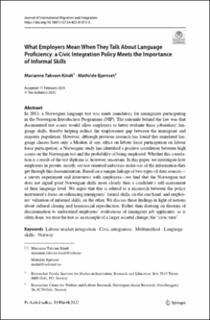What Employers Mean When They Talk About Language Proficiency: a Civic Integration Policy Meets the Importance of Informal Skills
Peer reviewed, Journal article
Published version
Date
2023Metadata
Show full item recordCollections
Original version
10.1007/s12134-023-01012-0Abstract
In 2013, a Norwegian language test was made mandatory for immigrants participating in the Norwegian Introduction Programme (NIP). The rationale behind the law was that documented test scores would allow employers to better evaluate these jobseekers’ language skills, thereby helping reduce the employment gap between the immigrant and majority population. However, although previous research has found that mandated language classes have only a Modest, if any, effect on labour force participation on labour force participation, a Norwegian study has identified a positive correlation between high scores on the Norwegian test and the probability of being employed. Whether this correlation is a result of the test diploma is, however, uncertain. In this paper, we investigate how employers in private, mostly service-oriented industries make use of the information they get through this documentation. Based on a unique linkage of two types of data sources—a survey experiment and interviews with employers—we find that the Norwegian test does not signal good Norwegian skills more clearly than a candidate’s self-assessment of their language level. We argue that this is related to a mismatch between the policy instrument’s focus on enhancing immigrants’ formal skills, on the one hand, and employers’ valuation of informal skills, on the other. We discuss these findings in light of notions about cultural cloning and homosocial reproduction. Rather than drawing on theories of discrimination to understand employers’ evaluations of immigrant job applicants, as is often done, we treat the test as an example of a larger societal change, the “civic turn”.
